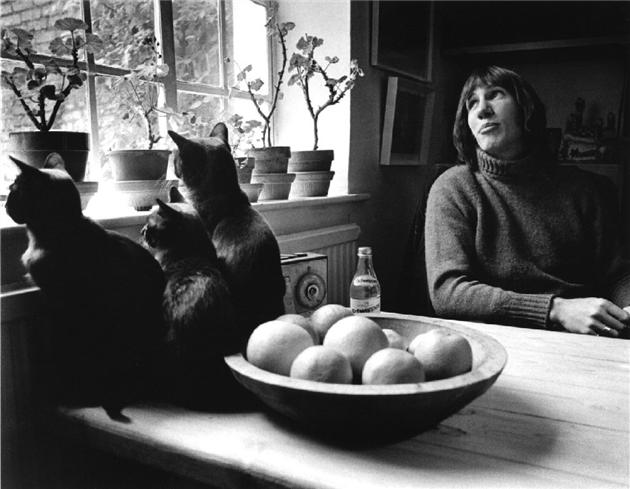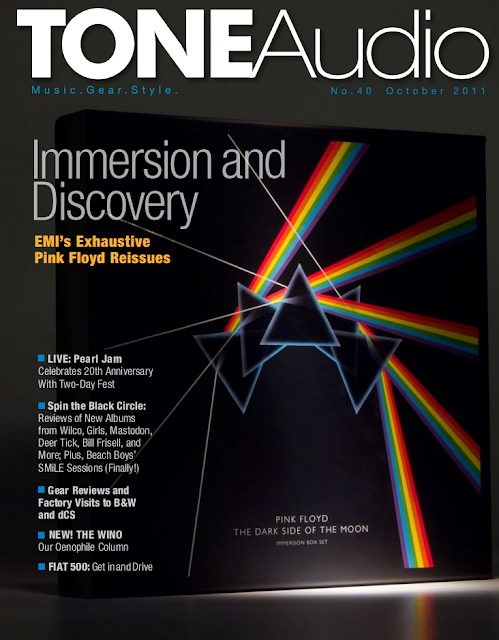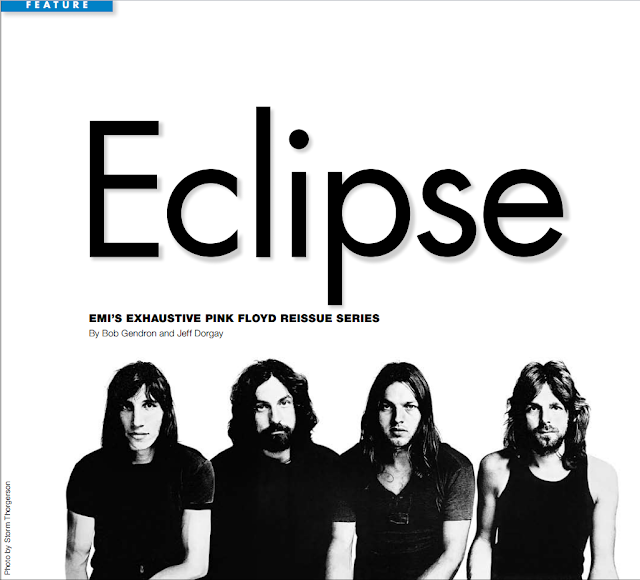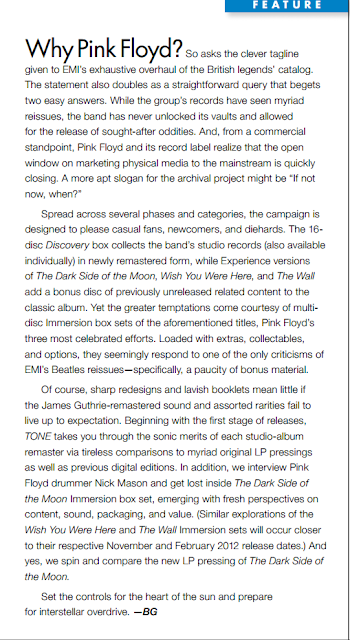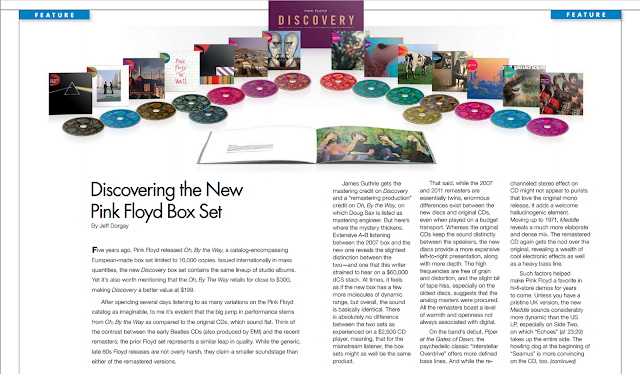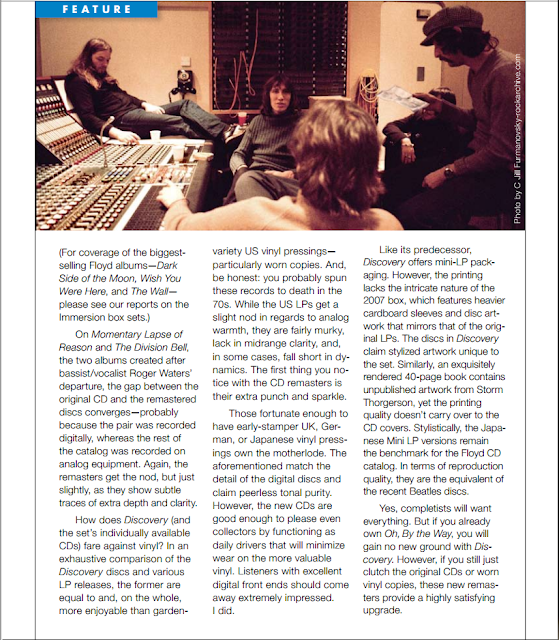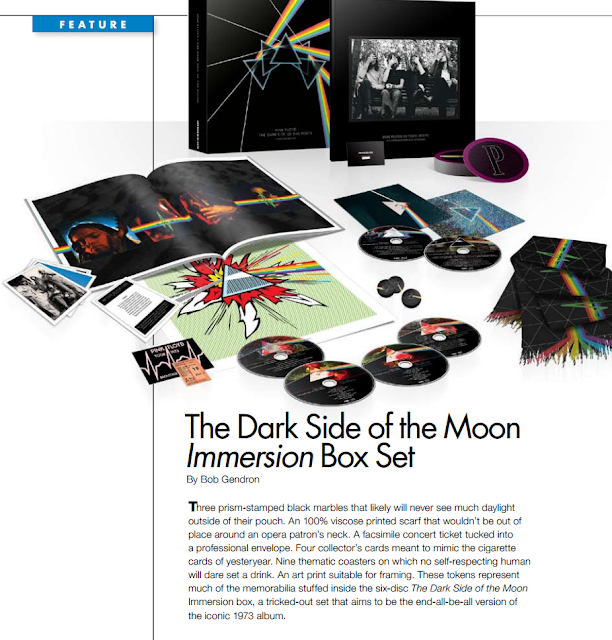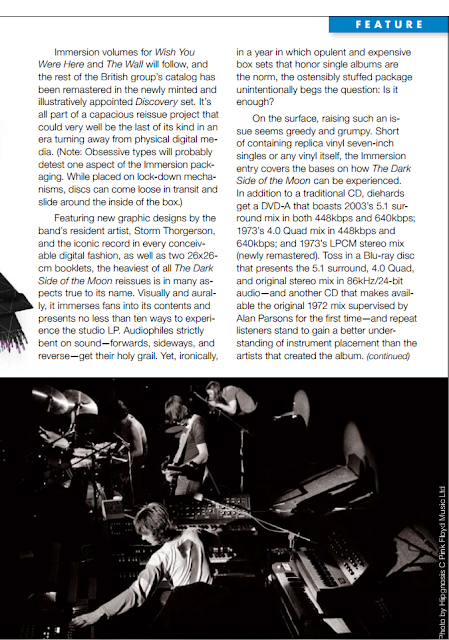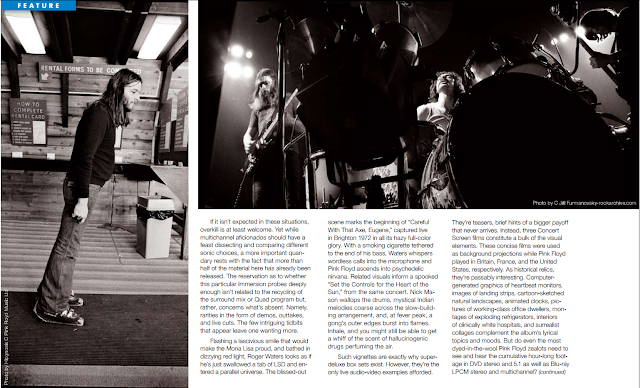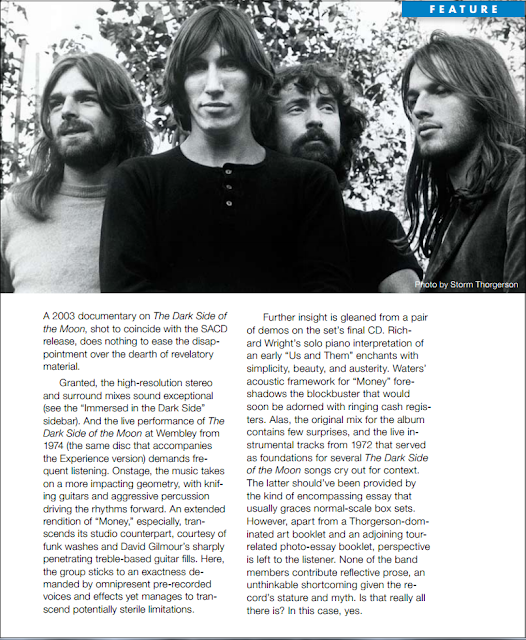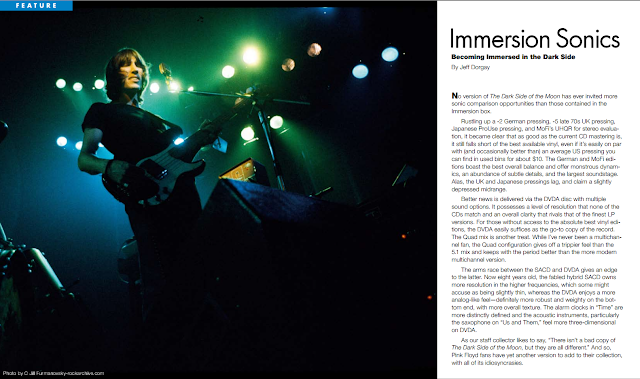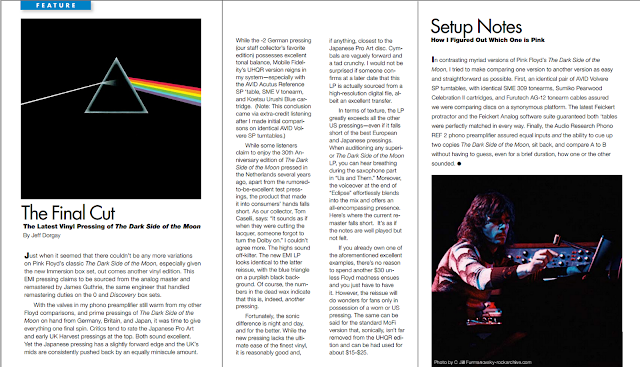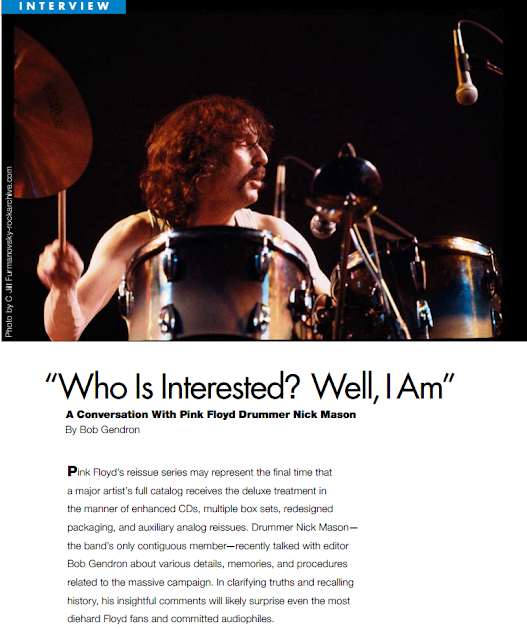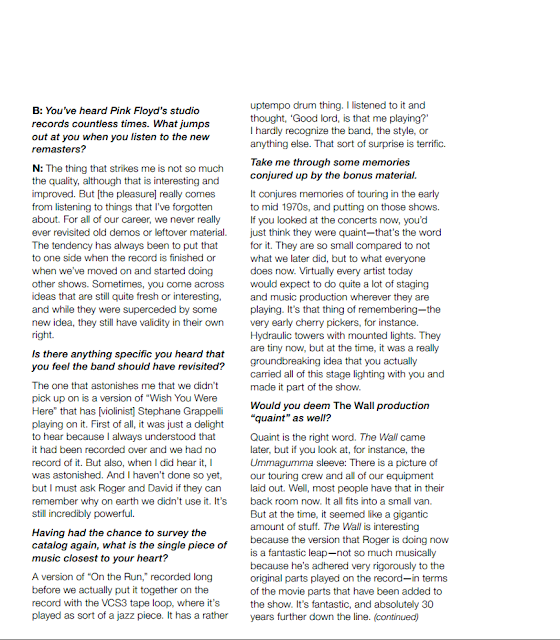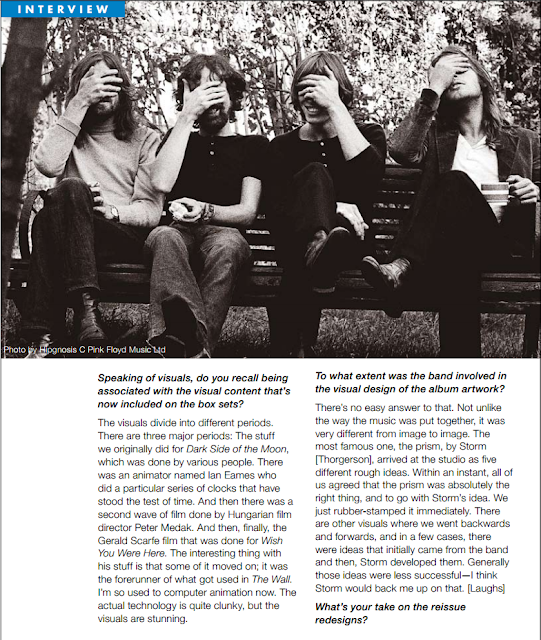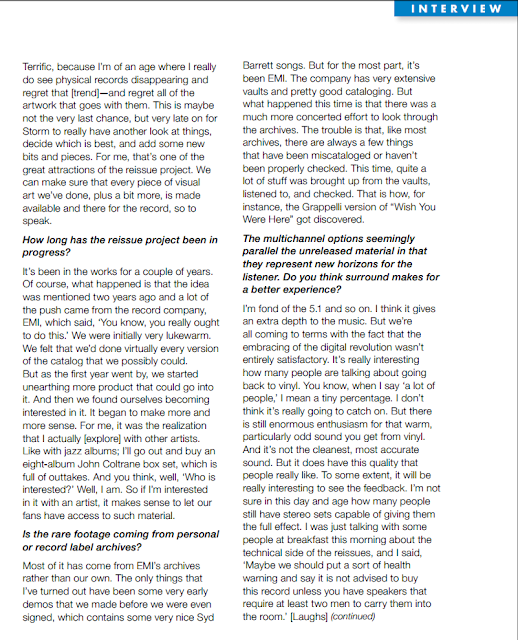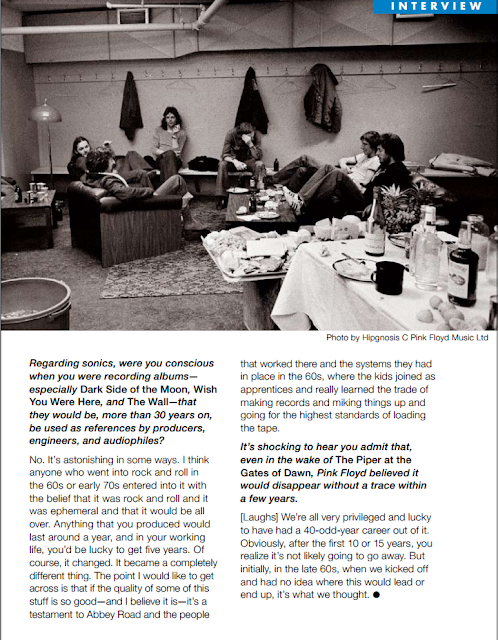2012/08/30
The story behind Pink Floyd's 'Wish You Were Here' - Digital Journal,Aug 10, 2012
The story behind Pink Floyd's 'Wish You Were Here'
Pink Floyd's 1975 album, "Wish You Were Here", has been considered a favorite among fans and members of the band alike. The follow-up to the largely successful "Dark Side of the Moon", WYWH has gotten a Blu-ray documentary about how this gem was created.
The iconic Pink Floyd album, Wish You Were Here, is now having its true story told thanks to Eagle Rock Entertainment. The Blu-ray documentary, Pink Floyd: The Story of Wish You Were Here, documents the band's production of the 1975 follow-up to the smash hit, Dark Side of the Moon reports Laughing Squid.
According to Open Culture, the behind-the-scenes look at WYWH kicks off with the creation of the ethereal tune that is "Shine on You Crazy Diamond," inspired by the tragic fall of the group's first front-man, Syd Barrett.
The recording sessions for Wish You Were Here were some of the last Barrett was seen in public. He showed up at Abbey Road Studios with his head and eyebrows shaven, appearing quite portly as well. His former bandmates initially didn't even recognize him. The experience even led Barrett to be the main influence of Bob Geldof's character, Pink, from the motion picture, The Wall.
Barrett finally went into permanent seclusion in 1978 up until his death from pancreatic cancer in 2006, sans a brief trip to London in 1982. He had also been battling diabetes for several years.
Wish You Were Here is often touted as a favorite Pink Floyd album by fans, as well as bandmembers David Gilmour and the late Richard Wright.
The following is a short synopsis for the film:
"This program tells the story of the making of this landmark release through new interviews with Roger Waters, David Gilmour and Nick Mason and archive interviews with the late Richard Wright. Also featured are sleeve designer Storm Thorgerson, guest vocalist Roy Harper, front cover burning man Ronnie Rondell and others involved in the creation of the album. Original recording engineer Brian Humphries revisits the master tapes at Abbey Road Studios to illustrate aspects of the songs construction.
"Bonus Features: The Blu-ray contains additional bonus material not featured in the TV broadcast version, including further interviews with Roger Waters, David Gilmour and Nick Mason plus Roger Waters and David Gilmour performing excerpts from the Wish You Were Here album."
By Abigail Prendergast
From www.digitaljournal.com
2012/08/26
Roger Waters guests at G.E. Smith's 60th birthday concert
Thursday, 22 August 2012, Roger Waters was a surprise guest on stage joining G.E. Smith on stage at The Stephen Talkhouse in Amagasnett, NY, for G.E.'s belated 60th. Accompanying them were Abe Fogle on drums and Jeff Kazee on piano.
Roger Waters: Breaking Down The Wall - Guitar.com, April 2002
Roger Waters -- once the chief songwriter in the band Pink Floyd and an erstwhile solo artist since 1984 -- has come out from behind a wall of his own making and is letting fans see him "In the Flesh" again.
Largely absent from the music scene since the early '90s, Waters took an active role last year in the assembling of Is There Anybody There: The Wall Live 1980-81, a document of the concerts Pink Floyd performed for its multi-platinum 1979 opus The Wall. More importantly, he assembled a band and has toured each of the past two summers, playing a selection of Pink Floyd favorites and material from his solo career.
The new album he's working on has not been completed yet, but these days Waters -- who has a reputation as a meticulous perfectionist and taskmaster -- is enjoying the simple act of playing music for an audience and re-creating his old songs with a band of luminaries, which includes the triple guitar arsenal of Doyle Bramhall III, onetime Pink Floyd sideman Snowy White, and Andy Fairweather-Low. His battles with his former bandmates seem to be well in the past now, and Waters comes off as fully engaged in his current endeavors.
Guitar.com: What inspired you to return to tour again?
Roger Waters: I did a show for Don Henley in '92, when I was in L.A. working on Amused to Death. It was a charity gig for his Walden Woods project, and we did it in the Universal Amphitheater, just four guys who got together and did a few songs each -- John Fogerty, Neil Young, me, and Don himself. And I did four or five songs using his band, and I just found I really, really enjoyed it, playing a few of the old songs. The audience was really, really receptive, really warm. At that point, I thought, "I want to do this again."
Guitar.com: It's interesting because the touring hasn't been tied to a particular album or other product.
Waters: I wanted to do a kind of small tour, nothing huge, just kind of drift around a few gigs in the States and put a little show together. Nothing too big, and keep it kind of reasonably relaxed and just do it. And that's what we did.
Guitar.com: Has performing the songs in that context given you any new insights?
Waters: Yes, some of them take on different connotations. I don't know if I can be specific about that, but some of the songs which might have been written in the first case about something specific now have kind of a universal connection to them. I guess a song like "Wish You Were Here" might be a good case in point; that can be about almost any absence, thought I guess even that song has pretty specific lyrics about 'exchanging walk-on parts for lead roles in cages.' But, nevertheless, it's kind of a song about loss.
Guitar.com: It's quite a band you've been working with, particularly the guitarists. How did you bring them all together?
Waters: Well, I've known Andy Fairweather-Low for a long time, and I?ve known Snowy for even longer. And I've always admired Snowy's playing. I didn't know Doyle; at one point, Patrick Leonard was going to go on the road with us, and he actually recommended Doyle Bramhall to me. And then Doyle made a demo of himself singing the choruses of "Comfortably Numb" and playing a solo over it, which he made at home and sent to me, and I thought it was pretty cool. And then we met and I liked him.
Guitar.com: You also have Jon Carin on keyboards, which is interesting because he also played with Pink Floyd on its last couple of tours. Did that present any sort of problem?
Waters: Not really. He does a specific job, and he does it particularly well. I don't have any worry about the fact that he's somebody who might be seen to have been in another camp at some point. That's not a problem. He's a big fan of the music and the songs, and he expressed that very clearly when we spoke on the telephone before we rehearsed together. I think he may have been [intimidated]; there's no question that I would have been bad-mouthed to some quite considerable extent, surely, in his presence because of the work he had done with those other guys. They would have built up a strange picture of me as this autocratic monster. I think people who have been in that environment are always surprised when they meet me and discover how warm and cuddly I am.
Guitar.com: Has some of the rancor subsided? I was impressed that in the booklet accompanying "Is There Anybody Out There," that none of you took gratuitous potshots at each other.
Waters: Yeah, well, I think there's been quite enough of that to last us all for the rest of our lives.
Guitar.com: Did you enjoy revisiting The Wall period for the live album?
Waters: Yeah, I did. The overriding memories are positive. It was an amazing thing to be part of. It was an extraordinarily ambitious project. I had a great team of people working with me. I think we made a pretty extraordinary show that was wonderful to do. It gripped the audience. The audience just sat there, open-mouthed, more or less through the whole thing, hardly able to believe what was going on in front of them and particularly at the end, when these 22-pound cardboard bricks were crashing almost into their laps. It was quite a stunning moment of rock theater, and I think it may well be that it was kind of a pinnacle of where rock theater went to.
Guitar.com: What's the status of your next album at the moment?
Waters: I've got five songs done. Four of them have got lyrics, and one of them I'm working on the lyrics at the moment. The one I'm working on seems to be developing into something that might be called "Love in Spite of Traffic," which is a strange kind of concept. I think for the whole thing I started off thinking it was going to be about "Each Small Candle," which is the one new song we played in the show, and a rap built around the chorus line, which was 'each small candle lights a corner of the dark.' The idea implicit is that we each have within us a flickering flame that's capable of lighting a little bit of darkness -- that remains to be lit in the more general sense of the way human beings organize themselves, and that we're all as important as one another and we all have a personal responsibility to maybe make one significant or beautiful mark on the big painting. I have a very strong sense that we're all in this together, somehow.
Guitar.com: Are you anticipating another thematic project, then?
Waters: I think so, yeah. I've always been obsessed with the idea of senseless death and destruction and pain and poverty and things that are actually avoidable and may well be becoming more avoidable as we learn to communicate with each other more directly -- even, dare I say, the possibilities that are opened up by the Internet and information technology. I guess you may say that I'm a dreamer, but I'm not the only one.
From guitar.com
Largely absent from the music scene since the early '90s, Waters took an active role last year in the assembling of Is There Anybody There: The Wall Live 1980-81, a document of the concerts Pink Floyd performed for its multi-platinum 1979 opus The Wall. More importantly, he assembled a band and has toured each of the past two summers, playing a selection of Pink Floyd favorites and material from his solo career.
The new album he's working on has not been completed yet, but these days Waters -- who has a reputation as a meticulous perfectionist and taskmaster -- is enjoying the simple act of playing music for an audience and re-creating his old songs with a band of luminaries, which includes the triple guitar arsenal of Doyle Bramhall III, onetime Pink Floyd sideman Snowy White, and Andy Fairweather-Low. His battles with his former bandmates seem to be well in the past now, and Waters comes off as fully engaged in his current endeavors.
Guitar.com: What inspired you to return to tour again?
Roger Waters: I did a show for Don Henley in '92, when I was in L.A. working on Amused to Death. It was a charity gig for his Walden Woods project, and we did it in the Universal Amphitheater, just four guys who got together and did a few songs each -- John Fogerty, Neil Young, me, and Don himself. And I did four or five songs using his band, and I just found I really, really enjoyed it, playing a few of the old songs. The audience was really, really receptive, really warm. At that point, I thought, "I want to do this again."
Guitar.com: It's interesting because the touring hasn't been tied to a particular album or other product.
Waters: I wanted to do a kind of small tour, nothing huge, just kind of drift around a few gigs in the States and put a little show together. Nothing too big, and keep it kind of reasonably relaxed and just do it. And that's what we did.
Guitar.com: Has performing the songs in that context given you any new insights?
Waters: Yes, some of them take on different connotations. I don't know if I can be specific about that, but some of the songs which might have been written in the first case about something specific now have kind of a universal connection to them. I guess a song like "Wish You Were Here" might be a good case in point; that can be about almost any absence, thought I guess even that song has pretty specific lyrics about 'exchanging walk-on parts for lead roles in cages.' But, nevertheless, it's kind of a song about loss.
Guitar.com: It's quite a band you've been working with, particularly the guitarists. How did you bring them all together?
Waters: Well, I've known Andy Fairweather-Low for a long time, and I?ve known Snowy for even longer. And I've always admired Snowy's playing. I didn't know Doyle; at one point, Patrick Leonard was going to go on the road with us, and he actually recommended Doyle Bramhall to me. And then Doyle made a demo of himself singing the choruses of "Comfortably Numb" and playing a solo over it, which he made at home and sent to me, and I thought it was pretty cool. And then we met and I liked him.
Guitar.com: You also have Jon Carin on keyboards, which is interesting because he also played with Pink Floyd on its last couple of tours. Did that present any sort of problem?
Waters: Not really. He does a specific job, and he does it particularly well. I don't have any worry about the fact that he's somebody who might be seen to have been in another camp at some point. That's not a problem. He's a big fan of the music and the songs, and he expressed that very clearly when we spoke on the telephone before we rehearsed together. I think he may have been [intimidated]; there's no question that I would have been bad-mouthed to some quite considerable extent, surely, in his presence because of the work he had done with those other guys. They would have built up a strange picture of me as this autocratic monster. I think people who have been in that environment are always surprised when they meet me and discover how warm and cuddly I am.
Guitar.com: Has some of the rancor subsided? I was impressed that in the booklet accompanying "Is There Anybody Out There," that none of you took gratuitous potshots at each other.
Waters: Yeah, well, I think there's been quite enough of that to last us all for the rest of our lives.
Guitar.com: Did you enjoy revisiting The Wall period for the live album?
Waters: Yeah, I did. The overriding memories are positive. It was an amazing thing to be part of. It was an extraordinarily ambitious project. I had a great team of people working with me. I think we made a pretty extraordinary show that was wonderful to do. It gripped the audience. The audience just sat there, open-mouthed, more or less through the whole thing, hardly able to believe what was going on in front of them and particularly at the end, when these 22-pound cardboard bricks were crashing almost into their laps. It was quite a stunning moment of rock theater, and I think it may well be that it was kind of a pinnacle of where rock theater went to.
Guitar.com: What's the status of your next album at the moment?
Waters: I've got five songs done. Four of them have got lyrics, and one of them I'm working on the lyrics at the moment. The one I'm working on seems to be developing into something that might be called "Love in Spite of Traffic," which is a strange kind of concept. I think for the whole thing I started off thinking it was going to be about "Each Small Candle," which is the one new song we played in the show, and a rap built around the chorus line, which was 'each small candle lights a corner of the dark.' The idea implicit is that we each have within us a flickering flame that's capable of lighting a little bit of darkness -- that remains to be lit in the more general sense of the way human beings organize themselves, and that we're all as important as one another and we all have a personal responsibility to maybe make one significant or beautiful mark on the big painting. I have a very strong sense that we're all in this together, somehow.
Guitar.com: Are you anticipating another thematic project, then?
Waters: I think so, yeah. I've always been obsessed with the idea of senseless death and destruction and pain and poverty and things that are actually avoidable and may well be becoming more avoidable as we learn to communicate with each other more directly -- even, dare I say, the possibilities that are opened up by the Internet and information technology. I guess you may say that I'm a dreamer, but I'm not the only one.
From guitar.com
2012/08/18
2012/08/14
2012/08/13
Roger Waters - Rock In Rio (Portugal, Lisbon, 2006) - Full
Roger Waters - Tour 2006
2 June Portugal Lisbon - Rock in Rio Festival
Official attendance 70,000
2012/08/08
Roger Waters interview - ANZ Rocksat, Australia - May 4th 1988
"KH" is Kevin Hillier, the host of the phone-in program, and Roger is live via satellite, in London.
KH: I'm Kevin Hillier!
Tonight it's radio KAOS (isn't it always?) as we welcome our very special guest, live from London, former Pink Floyd man, Roger Waters. So jump on the phone to talk to Roger Waters in London.
And welcome to a very special edition of ANZ Rocksat; live in the palatial BBC Woodlands studios in London is Roger Waters.
Good evening, Roger, how are you?
Roger Waters: I'm alright Kevin - how are you?
KH: Now are they palatial BBC studios? We hear so much about the *Beeb* over here.
Roger Waters: They certainly are. It's sort of ... rococo marble floors, marble ceiling...
KH: (sighs)
Roger Waters: ... it's exquisite...
KH: Divine...
Roger Waters: It's all done in the best possible taste...
KH: (Sniggers)
KH: And so too hopefully will be the next hour of Rocksat for ANZ bank, and in fact we're making a little bit of radio history tonight, because it is the very first international Rocksat, broadcast from London, and you are able to talk to Roger, simply by picking up the phone. It's been about 15 years since you were last in Australia, Roger - uh looking forward to tonight, and talking to some of the people who just may have seen you on that tour?
Roger Waters: Yes.
KH: Alright, well lets get stuck into it - straight up -here IS Roger Waters, Radio Waves from Radio KAOS... (Radio Waves is played)
KH: Roger, Radio KAOS in LA, is there actually such a stations
Roger Waters: No there isn't. Er, there is a Radio KAOS, but it's a student Station in Oregon.
KH: Right. Oh well we hopefully... er won't...
Roger Waters: but...
KH: yeah...
Roger Waters: Yeah, I was jus... I was just gonna say that KAOS is loosely based upon a station that closed in LA last year called KMET.
KH: Oh, right! Is that actually a guy that you'd used the voice-overs for, who actually worked on KMET?
Roger Waters: Yeah, Jim Ladd was one of the DJs at KMET, in it's heyday.
KH: Well, let's hit the phones now... And First up is Rex, listening to MMM in Sydney. Hi Rex...
Rex: How are ya?
KH: Bounce your call across the the uh satellite links to London.
Rex: I'm bounced.
(general laughter)
KH: OK...
Rex: Hello...
Roger Waters: Hi Rex.
Rex: Hello, how are you, man?
Roger Waters: All right, thanks.
Rex: That's not bad. Well, my question was, what inspired you to write The Wall, because I'm a really big fan?
Roger Waters: A number of things, but the starting point for the Wall was playing a gig at Olympic Stadium in Montreal in 1977 at the end of the Animals tour...
Rex: Right.
Roger Waters: ...and I'd finally become completely disillusioned with the whole idea of stadium gigs in rock 'n roll, because I'd come to the conclusion they're not about music or communication or any of the things that I'm interested in - they're only about money.
Rex: Yeah, sure, - I can dig that.
Roger Waters: And so the theatrical idea which was the centre of the theme of building a wall of bricks across the front of the stage, while a band is actually playing, is an expression of the distance I was feeling at that time from the audience. Ummmh...
Rex: Did this have anything to do with your actual life, or you know, your early life?
Roger Waters: Yeah it is it is partially uh autobiographical... I've taken ...it's... it's a lot about my early life... I mean my father being killed and all that stuff, and... and some of it's about Syd and some of it's drawn from other experiences, you know... writing a piece like that's a bit like... I suppose writing a novel, or writing anything - you draw largely from your own experience, but also from other peoples that you know well.
KH: Alright Rex, thanks a lot for your call, listening to MMM in Sydney. Now we've got er Jeff listening to FM 104 in Brisbane - hi Jeff!
Jeff: G'day.
KH: What's your question for Roger?
Jeff: Roger, speaking about Syd - what is Syd Barrett doing nowadays?
Roger Waters: He just lives quietly in Cambridge, with his mum.
KH: He's not involved in music at all, Rog?
Roger Waters: No. He's not involved in anything very much.
Jeff: Damn shame...
Roger Waters: Well, he's schizophrenic..., and has been since 1968.
Jeff: ohhh...
KH: Gee, that's sad - that is sad... thanks for your call, Jeff.
Jeff: Thank you.
KH: And now we move onto Kaye, listening to FOX-FM in Melbourne - hi Kaye!
Kaye: Hi. How are you?
KH: I'm terrific - what's your question for Roger Waters?
Kaye: Right - Roger. I was just wondering - with your song "Wish You Were Here" - was that directed at anyone in particular, or was it just another of your great songs?
Roger Waters: Ahh, no - it wasn't directed at - I s'pose you could say within the context of that record it... maybe... it was more about Syd Barrett than about anyone else. Though I would have to try and remember all the lyrics - no, it think it was - it was more a general song about... umm... feeling a sense of loss when you're not with somebody that you love, or have loved, or...
Kaye: Yeah, that's what I thought... it's really deep and it's an excellent song, like all your others...
Roger Waters: Thank you.
Kaye: OK, nice talking with you, Roger.
Roger Waters: And you.
KH: Kaye, thanks for your call, listening to FOX-FM in Melbourne - actually, we'll give you a chance to re-live the lyrics of "Wish You Were Here" a little later on, Roger - we're gonna actually play a live version from your solo tour, out of last year, when you played in Quebec, in Canada. Remember that gig?
Roger Waters: I do indeed.
KH: Alright, we're gonna play that a little later on, but right now we might slip into a Pink Floyd classic, featuring Roger - Money... (Money is played)
KH: We've got Cheryl, listening to 96 FM in Perth - hi, Cheryl!
Cheryl: Hello - how are you?
KH: I'm fine - you have a question for Roger?
Cheryl: Roger, I'd like to ask you - what your ultimate goal in life would be?
Roger Waters: I'd like to die a very old and happy man.
KH and Cheryl: (general laughter)...
KH: Sounds fair to me. How about musically, Roger?
Roger Waters: Musically?... Well, I'd just like to go on doing work that I... ahh, believe in.
KH: Yeah. Do you have any... um... do you have... do you set yourself goals for albums, in terms of... you'd like it to get to this position on the chart - do you... do you have those kind of, err material goals, with your music?
Roger Waters: Ahh, no. They're a bit of a waste of time. It's best to just throw 'em out, and see what happens.
KH: Alright.
Roger Waters: There... there are other things I want to do. I'm involved at the moment in uhh ... I'm trying to find a decent film project...
KH: Ohhhhh...
Roger Waters: to do a film score for - and there's one in the pipeline that will be great, if it comes off...
KH: Alright, thanks for your call, Cheryl, listening to 96 FM in Perth, and now we've got Peter, listening to SA-FM in Adelaide... hi Pete!
Pete: Hi.
KH: Your question for Roger...
Pete: Yeah, Roger, umm on the last album, Radio KAOS - the err rather optimistic song, "The Tide is Turning" - I was wondering if that was a genuine feeling, or just wishful thinking, and if so err where you sort of found this optimism, where you saw the tide was turning.
Roger Waters: Sorry, what was your name again?
Pete: Pete.
Roger Waters: Well, I tend to go up and down like a yo-yo, Pete.. some.. some... some uhh afternoons I feel extremely optimistic and uhh sometimes uhh at four o'clock in the morning, I feel a deep and black gloom coming over me, as I... as I lie awake...
Pete: Yeah.
Roger Waters: I feel we're at a bit of a watershed, you know, and... uhh, my hope is that umm because of the advances that have been made in the technology of communication, it... it becomes easier and easier for individuals to communicate directly with one another, and bypass uhh the powers that be, and uhh take control of the uhh ... of the uhh... the way the uhh... the Earth is organised. Uhh, uh, at this time, at twenty-four minutes past twelve on this.... uh Wednesday afternoon, am I... I am optimistic now!
Pete: Oh, that's good...
Roger Waters: But by tea time I might be pessimistic again, y'know, it's a... it's a... it's a strange piece of history we're living through, but at least because of uhh... television, we all get a chance to see more of what's going on than they did in the middle of the last century.
Pete: Right...
KH: Thanks for your call, Pete.
Pete: OK, thank you.
KH: We might slip into into, err... a track that's live and exclusive to Rocksat tonight, and it err goes back to err 1987 - Roger, your solo tour - you were in Quebec, in Canada - was it a good night?
Roger Waters: It was a great night, yeah... the... the French Canadians are very warm people, and it was a good night.
KH: Well, let's have a listen to it now, live and exclusive to Rocksat - Wish You Were Here... (Wish You Were Here is played)
KH: Live and exclusive to Rocksat - that's err Roger Waters and The Bleeding Hearts Band, recorded in Quebec, during Roger's solo tour in 1987... and Wish You Were Here... who was in the band at that stage, Roger?
Roger Waters: Uhh, Graham Broad on drums, Katie Kassoon and Doreen Chanter... vocals, Paul Carrack... keyboard and vocals, uhh... Andy Fairweather Low... vocals and umm guitars and bass, Mel Collins... saxophones, and Jay Stapley... guitar.
KH: Now, you're currently putting together a new album - umm is that the same people who you have involved in this new album you're recording?
Roger Waters: Umm - Andy Fairweather Low is involved and.. uhh, most of the people are the same... yeah, most of the people are the same.
KH: Andy Fairweather Low of course will be remembered as a member of Amen Corner, here in Australia, who had... uh... one big hit, of "Paradise is Half as Nice." Good stuff! Lets... uhh, let's hit the phones again... 008 033 300 is the number, if you want to talk to Roger tonight, who's sitting in the BBC studios in London... we've got Karen, listening to MMM in Sydney - hi!
Karen: Hi!
KH: What's your question for Roger?
Karen: Uhh... who wrote most of the... uhh... songs for Pink Floyd?
Roger Waters: I didn't catch that, Karen.
Karen: Umm... who wrote most of the songs for Pink Floyd?
Roger Waters: (mostly laughter, and a canine grin)... Errr... I did.
Karen: (giggles) You did (giggles)...
Roger Waters: Yes, I did...
KH: And justifiably proud of the fact, too, I would imagine?
Roger Waters: Wellll... I dunno...
KH: YEAH! Is there any you go back on, and go "Awwww.. wish I hadn't done that"?
Roger Waters: Umm... possibly "Take Up Thy Stethoscope and Walk" from the very first album..., but... but most of it I err... quite like... I'm not very keen on Atom Heart Mother, for students of... uhh... of the old Pink Floyd catalogue - I thought that was rather a... a - I thought the err... instrumental piece that takes up side one was rather dull, in retrospect.
KH: Alright, thanks for your call, Karen. We've got Rob in Perth, listening to 96 FM - hi Rob!
Rob: Hi!
KH: Fire your question at Roger.
Rob: Uhh yeah - I saw Pink Floyd ummm a few months ago, but I've never seen you in concert, so I was wondering if you had any plans to tour Australia in the near future?
Roger Waters: Umm... well I... you were... you were... you were all part of my plan err last year, when I was errr... I was touring err ... I toured America for a couple of months, and the plan was to go on to err... Australia, and we had talks with... who's the promoter there? Paul Dainty, is it?
KH: Yesss, there's a couple of them, actually, but he's one of them...
Roger Waters:Yeah, I think... I think it was him - yeah - and, uhh..., there was no interest, I am afraid, so we couldn't come.
Rob: Ohh... right...
Roger Waters: It's not something that I can do... as a hobby...
Rob - Yeah...
KH: (laughs)... Is it...uhh...
Roger Waters: ... Y'know, I put on a... well... I put on a... well... a very involved show, with uhh Quad sound and films and all the kinds of things I used to do with Floyd, and it costs a lot of money to take it around... I'm not just... I'd like to come to Australia... there has to be interest there, before I can tour.
KH: I think there is certainly interest now since The Tide is Turning - it got a lot of radio airplay in Australia, and I think people are more aware of what you are doing now.
Roger Waters: Well...
KH: ... COME ON DOWN!
Roger Waters: ... I will approach all the Australian promoters, and if any one of them is prepared to offer me a deal that... that doesn't cost me - I don't need to make a profit, but I... but I really err... can't go on, y'know, spending lots of money, touring strange places. I'd love to go to Australia and play!
KH: Alright, thanks for your call, Rob.
Rob: Yep... no worries...
KH: We might slip into a little bit more, urrr... music, on Rocksat, live via satellite across Australia, and tonight across the world with Roger Waters - you can join us on 008 033 300. Here's the Floyd, with uh... Another Brick in the Wall... (Another Brick in the Wall Part II is played)
KH: Another Brick in the Wall, Roger?... uhhhm - the film that was made... uh based on... on a lot of that work... umm - what did you think of that film, when it was all sort-of washed up, and you had a chance to have a look at it, maybe a few years down the track?
Roger Waters: Well, I haven't looked at it err recently, but I was... I was a bit disappointed with it in the end, because umm at the end of the day I felt no sympathy at all with err the lead character... the character that Geldof played.
KH: Yeah, right...
Roger Waters: A... and I err found it was mmm so unremitting in its onslaught upon the senses, that umm... it didn't actually err... give me, anyway, as an audience, a chance to get involved with it.
KH: Alright... well we might...
Roger Waters: It was spectacular I thought, visually... umm I mean...
KH: Yes!
Roger Waters: ... I mean Alan Parker is... is... ahhh is a ve... is an extremely accomplished technician. (laughs)...
KH: (giggling away conspiratorially)... Said he laughingly... alright!... - If you want to talk to Roger tonight, about anything ahh you like, you can give us a call... it's as simple as picking up the phone, and here's the number to dial...
KH: Well, let's hit the phones again, to talk to Roger Waters, and first up... John, listening to SA-FM, in Adelaide - hi John!
John: G'day.
KH: You have a question for Roger, obviously...
John: Yes, please...
KH: Go ahead!
John: Ahh... G'day Roger - umm, why do you always wear dark glasses when you're having your photo taken?
Roger Waters: Well... well I haven't always in the past... I have recently, ummm .... and I'll tell you why... it... it means that if I can project an image of someone wearing dark glasses, then when I'm not wearing them (and wearing dark glasses is something I very rarely do)... nobody recognises me!
John: Ohh, yeah...
Roger Waters: Which is, err ... y'know... something I'd like to promote. To preserve my anonymity.
(general laughter)
KH: Actually, you're famous for your anonymity, aren't you, Roger?
Roger Waters: (laughs, very briefly) [Ed. The laugh is vaguely reminiscent of the look of a dog, when you suddenly realise that it just might bite]
KH: ... uh, never mind... thanks for your call, John.
John: No worries - thanks.
KH: We have err Jefferson, listening to FM 104 in Brisbane - hi! Jefferson - G'day!
KH: Alright - fire your question at Roger, listening to... ahh... to you, in the BBC studios in London.
Jefferson: Righty- ho... yeah, Roger? Uhh, out of the Pink Floyd albums, which one would be your favourite, and why?
Roger Waters: The Wall. Because it has... well actually, no, I don't... YES... I s'pose I said that without thinking, so it probably is. I dunno, its very complete... it's got... its...its..i... its got great form, I believe...
Jefferson: Yeah, right...
Roger Waters: And it's...
Jefferson: I was hoping...
Roger Waters: uhh...
Jefferson: ... 't might be Ummagumma!
Roger Waters: You were, were you?... Umm, remind me of Ummagum.. that was the one with... umm... where half the album was live from Mothers' in Birmingham, and the other half was bits that we all made up individually.
Jefferson: That's the one...
Roger Waters: Yeah... - well, that's - not - my - favourite...!
KH: (laughs)... Thanks Jefferson, for your call. Now we've got David, listening to FOX in Melbourne. Hi Dave.
David: Hi!
KH: Your question for Roger?
David: What inspired you to write The Embryo, from the... on the Works album?
Roger Waters: Embryo?
Dave: Yeahh...
Roger Waters: Errr...
David: Previously unreleased...
Roger Waters: I... I honestly can't remember - we're talking about 20 years ago, now...
David: Well, I...
Roger Waters: I really don't remember!... is that Jefferson? Is that what I heard?
KH: No, David...
David - David...
Roger Waters: David! David... yeah... I don't remember, David.
David: Awwww... (sighs)...
Roger Waters: It's not a... a song I'm proud of... which is why it was never released on an album. It came out, I think, on a compilation album...
David: (sighs)... ohhh, OK.
KH: Alright - thanks for your call, David. And we might slip into a little more Radio KAOS - sound good to you, Roger?
Roger Waters: Why not.
KH: Alright, let's get into... umm the track that has been on radio stations, right across the country... The Tide Is Turning... (The Tide Is Turning is played)
KH: Roger Waters, from Radio KAOS - and he's on your radio station tonight, on Rocksat, live via satellite, across Australia, and across the world, to London's BBC Woodlands studios, where Roger is sitting, at this very moment. Aren't you, Roger!
Roger Waters: I am, sir!
KH: Alright... shortly we're going to draw the...
Roger Waters: And I'm sitting up straight, as well, Kevin!...
KH: that's good
Roger Waters: and I'm paying attention
KH: I'm pleased to see your posture has improved... shortly we're going to draw the winner of the... the "Rocksat Rock Sack", from Brashs, but first up were gonna hit the phones again, and we've got Donna, listening to err, 2PK, in Parkes... hi Donna!
Donna: Hi!
KH: You are going live to London, now, to talk to Roger...
Donna: Oh, that's great.
KH: Go for it!
Donna: Err, Roger? Do you mix socially with other... (clears throat) musish... musicians?
Roger Waters: Err, yeah! S... some, I do... yeah.
Donna: Whhhat... what, who like... could I ask who like?
KH: (laughs)
Roger Waters: (mild amusement) You don't want me to name names, do you, Donna?
Donna: n.. n.. ...not any particular name... like any band, or?
Roger Waters: Err, no - no, not really... just... just people who I have met socially... really... through... err... through other things..
KH: Well before the program sta...
Roger Waters: ... W...w... we spoke earlier about... umm - Kevin and I spoke earlier about Mike Rutherford, because we have a connection err via... Paul Carrack, who's done work for both of us...
Donna: Right, just general people...
Roger Waters: ...and I see him and his wife Angie from time to time.
Donna: Right - just general people that you meet in... in the circuit?
Roger Waters: Yeah... yeah - I don't... I don't kind of go and hang out at other people's houses, or in... in studios, or... or..., umm, it's... it's not... I don't lead that kind of life.
KH: Do you have musicians hanging out in your studio, though, 'cos you have a full studio setup at home...?
Donna: Ummmhhhh... (he he)
Roger Waters: Welll, uhh...
KH: N... n... not you, Donna - I meant Roger...
Roger Waters: (amused, and KH laughing in the background) Well, its possible, Kevin, that Donna has a studio setup at home as well - I mean let's not jump to hasty conclusions - but it's... I can only speak for my own... and no, I don't have musicians hang out - when they come to my studio, they... fffff-bleep-bleep-work... and uhh.. uhh...
KH: (laughter)
Roger Waters: (with some amusement) and they work bloody hard, as well - from the moment they arrive, until the moment we knock off...
KH: (still laughing)... alright...
Roger Waters: We do very little "hanging out".
Roger Waters: OK, thanks for your call, Donna.
Donna: OK- thank you.
KH: ... and John, listening to FOX FM in Melbourne has a question for you too, Roger. Hi John!
John: Hi... hi Roger!
Roger Waters: Hi John!
John: How are you?
Roger Waters: Um, I'm alright, thanks...
John: Good - I'd like to ask you, um, which town in England you originate from, and also, if that place has had any influence on your music?
Roger Waters: Umm, well I was born in Great Bookham, in Surrey, which is err near a town called Dorking, about twenty miles south of London...
John: yeah...
Roger Waters: ... and err so, for the first umm eighteen months of my life, we were being overflown by err Doodlebugs, err-umm which I don't really remember, and then we moved to Cambridge, which is where I was brought up, and I... I do remember moving to Cambridge, which is when I was... two, and I remember... I remember... uh... VJ night...
John: yeah...
Roger Waters: a big bonfire, and being held up to the window, and people with flags.. and dancing, and flickering light...
John: Yeah...
KH: Did it have any effect on... on you musically - that upbringing?
Roger Waters: Yeah - growing up in Cambridge certainly did, because it was a bit.. a University town, and there were lots of err... trad-jazz bands, when I was sort of eleven... twelve... thirteen... fourteen... growing up in the beginnings of umm... of err... rock 'n roll starting, via skiffle bands, and things like that, but mainly it was trad-jazz, and I... I... I used to go to umm dances in the Corn Exchange, and I'd... I'd stand there at the back, and err look at... y'know the guy playing the trumpet on the stage, and think 'Jesus, that looks good fun...
KH: (laughs in background)
Roger Waters: I'd like to be him. I... I wou... I want to be that person.' And so I'm... maybe that err was... uhh... something that was very likely to happen in... in err Cambridge, and not so likely to happen in Warrington, or Middlesborough, or somewhere...up North.
John: Yes, right...
KH: John, thanks a lot for your call.
John: Thank you.
KH: And, ahh... excuse me, Roger - I just have to dig into our little barrel here, our Rocksat barrel, and actually draw out a winner for our Rocksat Rocksack from Brashs, which is worth fifteen hundred dollars...
Roger Waters: (indecipherable, but in a friendly tone of voice)
KH: Yes?
Roger Waters: My time is your time...
KH: Ohhh... I... I... I...jusw...w...w...
Roger Waters: Sorry to interrupt... you carry on... you go ahead!
KH: I just want to dig in here, and grab this thing out... and see who we got... uhh - we actually have Grant Beale, or Grunt Beale, who lives in... (indecipherable)
Roger Waters: It's not likely to be...
KH: ... No, it wasn't you, unfortunately, Roger... I'm sorry about that!...uhh...
Roger Waters: ... No, I'm saying his name is not likely to be Grunt, is it?
KH: (laughs)... So, Grant has got that ahh... that Rocksat Rocksack, and what we'll do is try and phone him during this break, and have a talk to him after that, here on Rocksat, live via satellite, across Australia.
KH: Roger is sitting in the BBC err... Woodlands studios in London... Roger, what's... uhh... what's coming up for you now? I mean, you are in the middle of recording the album, and we do thank you for.. popping in tonight and... err taking time out from recording the album. How far along the track are you with it?
Roger Waters: I'm just about to start mixing. He can't have been listening tonight, can he, or he'd have known he'd won - if you see what I mean...
KH: (laughs)...
Roger Waters: ...Anyway, that's neither here nor there! Umm... I'm... yeah - I'm just about to start mixing, Kevin.
KH: Ahhh... now when are we likely to see this album?
Roger Waters: (draws in breath) I should think... err in September.
KH: Right... have have.. g... have you got any titles for the album ... have you sort of worked all that stuff out yet... you tell us about?
Roger Waters: Yeap-yeah-yeah - I've got... I've got all that worked out, but... umm... I'm...
KH: ...But you're not going to tell us?...
Roger Waters: ...anonymous...
KH: (laughs)
Roger Waters: ...Nope-no I'm not, but I - I am going to at this point, because we're running out of time now, say hello to Jo-Jo and Pauline, and Susie, and Janet, and Bronwyn.
KH: These are friends that you met on the... ahh... on the tour...
Roger Waters: ...These're...
KH: when you were here, in '73?
Roger Waters: N... N-no - these... these are old friends that I've met at... at other points in my life, which... and I won't go into it, but they know who they are.
KH: Right, now after you... after the album comes out, umm... are we... are we likely to see you err... touring around the world, and maybe coming down to Australia?
Roger Waters: Yeah, I'm... I'm ahh... my plan is to tour... err do some touring, starting in the States probably, in err... uhhm... let me think... Ma... probably March and April of next year, and as I said before - I would... I would dearly love to come to Australia.
KH: Well, its been a long time...
Roger Waters: Keep... yep...
KH: Fifteen years is a long time - I... I think Australia has changed a heck of a lot, and obviously what you are doing now has changed a heck of a lot, in that time?
Roger Waters: Yep!
KH: Well, listen - we thank
Roger Waters: W-w... ww.. ww.. w...
KH: you for taking
Roger Waters: Wwell..
KH: ...ahh time out from ahh... from recording the album...
Roger Waters: (short muffled chuckle)
KH: for joining us tonight on Rocksat...
Roger Waters: Kevin, it's been a... my pleasure, sir!
From www.brain-damage.co.uk
KH: I'm Kevin Hillier!
Tonight it's radio KAOS (isn't it always?) as we welcome our very special guest, live from London, former Pink Floyd man, Roger Waters. So jump on the phone to talk to Roger Waters in London.
And welcome to a very special edition of ANZ Rocksat; live in the palatial BBC Woodlands studios in London is Roger Waters.
Good evening, Roger, how are you?
Roger Waters: I'm alright Kevin - how are you?
KH: Now are they palatial BBC studios? We hear so much about the *Beeb* over here.
Roger Waters: They certainly are. It's sort of ... rococo marble floors, marble ceiling...
KH: (sighs)
Roger Waters: ... it's exquisite...
KH: Divine...
Roger Waters: It's all done in the best possible taste...
KH: (Sniggers)
KH: And so too hopefully will be the next hour of Rocksat for ANZ bank, and in fact we're making a little bit of radio history tonight, because it is the very first international Rocksat, broadcast from London, and you are able to talk to Roger, simply by picking up the phone. It's been about 15 years since you were last in Australia, Roger - uh looking forward to tonight, and talking to some of the people who just may have seen you on that tour?
Roger Waters: Yes.
KH: Alright, well lets get stuck into it - straight up -here IS Roger Waters, Radio Waves from Radio KAOS... (Radio Waves is played)
KH: Roger, Radio KAOS in LA, is there actually such a stations
Roger Waters: No there isn't. Er, there is a Radio KAOS, but it's a student Station in Oregon.
KH: Right. Oh well we hopefully... er won't...
Roger Waters: but...
KH: yeah...
Roger Waters: Yeah, I was jus... I was just gonna say that KAOS is loosely based upon a station that closed in LA last year called KMET.
KH: Oh, right! Is that actually a guy that you'd used the voice-overs for, who actually worked on KMET?
Roger Waters: Yeah, Jim Ladd was one of the DJs at KMET, in it's heyday.
KH: Well, let's hit the phones now... And First up is Rex, listening to MMM in Sydney. Hi Rex...
Rex: How are ya?
KH: Bounce your call across the the uh satellite links to London.
Rex: I'm bounced.
(general laughter)
KH: OK...
Rex: Hello...
Roger Waters: Hi Rex.
Rex: Hello, how are you, man?
Roger Waters: All right, thanks.
Rex: That's not bad. Well, my question was, what inspired you to write The Wall, because I'm a really big fan?
Roger Waters: A number of things, but the starting point for the Wall was playing a gig at Olympic Stadium in Montreal in 1977 at the end of the Animals tour...
Rex: Right.
Roger Waters: ...and I'd finally become completely disillusioned with the whole idea of stadium gigs in rock 'n roll, because I'd come to the conclusion they're not about music or communication or any of the things that I'm interested in - they're only about money.
Rex: Yeah, sure, - I can dig that.
Roger Waters: And so the theatrical idea which was the centre of the theme of building a wall of bricks across the front of the stage, while a band is actually playing, is an expression of the distance I was feeling at that time from the audience. Ummmh...
Rex: Did this have anything to do with your actual life, or you know, your early life?
Roger Waters: Yeah it is it is partially uh autobiographical... I've taken ...it's... it's a lot about my early life... I mean my father being killed and all that stuff, and... and some of it's about Syd and some of it's drawn from other experiences, you know... writing a piece like that's a bit like... I suppose writing a novel, or writing anything - you draw largely from your own experience, but also from other peoples that you know well.
KH: Alright Rex, thanks a lot for your call, listening to MMM in Sydney. Now we've got er Jeff listening to FM 104 in Brisbane - hi Jeff!
Jeff: G'day.
KH: What's your question for Roger?
Jeff: Roger, speaking about Syd - what is Syd Barrett doing nowadays?
Roger Waters: He just lives quietly in Cambridge, with his mum.
KH: He's not involved in music at all, Rog?
Roger Waters: No. He's not involved in anything very much.
Jeff: Damn shame...
Roger Waters: Well, he's schizophrenic..., and has been since 1968.
Jeff: ohhh...
KH: Gee, that's sad - that is sad... thanks for your call, Jeff.
Jeff: Thank you.
KH: And now we move onto Kaye, listening to FOX-FM in Melbourne - hi Kaye!
Kaye: Hi. How are you?
KH: I'm terrific - what's your question for Roger Waters?
Kaye: Right - Roger. I was just wondering - with your song "Wish You Were Here" - was that directed at anyone in particular, or was it just another of your great songs?
Roger Waters: Ahh, no - it wasn't directed at - I s'pose you could say within the context of that record it... maybe... it was more about Syd Barrett than about anyone else. Though I would have to try and remember all the lyrics - no, it think it was - it was more a general song about... umm... feeling a sense of loss when you're not with somebody that you love, or have loved, or...
Kaye: Yeah, that's what I thought... it's really deep and it's an excellent song, like all your others...
Roger Waters: Thank you.
Kaye: OK, nice talking with you, Roger.
Roger Waters: And you.
KH: Kaye, thanks for your call, listening to FOX-FM in Melbourne - actually, we'll give you a chance to re-live the lyrics of "Wish You Were Here" a little later on, Roger - we're gonna actually play a live version from your solo tour, out of last year, when you played in Quebec, in Canada. Remember that gig?
Roger Waters: I do indeed.
KH: Alright, we're gonna play that a little later on, but right now we might slip into a Pink Floyd classic, featuring Roger - Money... (Money is played)
KH: We've got Cheryl, listening to 96 FM in Perth - hi, Cheryl!
Cheryl: Hello - how are you?
KH: I'm fine - you have a question for Roger?
Cheryl: Roger, I'd like to ask you - what your ultimate goal in life would be?
Roger Waters: I'd like to die a very old and happy man.
KH and Cheryl: (general laughter)...
KH: Sounds fair to me. How about musically, Roger?
Roger Waters: Musically?... Well, I'd just like to go on doing work that I... ahh, believe in.
KH: Yeah. Do you have any... um... do you have... do you set yourself goals for albums, in terms of... you'd like it to get to this position on the chart - do you... do you have those kind of, err material goals, with your music?
Roger Waters: Ahh, no. They're a bit of a waste of time. It's best to just throw 'em out, and see what happens.
KH: Alright.
Roger Waters: There... there are other things I want to do. I'm involved at the moment in uhh ... I'm trying to find a decent film project...
KH: Ohhhhh...
Roger Waters: to do a film score for - and there's one in the pipeline that will be great, if it comes off...
KH: Alright, thanks for your call, Cheryl, listening to 96 FM in Perth, and now we've got Peter, listening to SA-FM in Adelaide... hi Pete!
Pete: Hi.
KH: Your question for Roger...
Pete: Yeah, Roger, umm on the last album, Radio KAOS - the err rather optimistic song, "The Tide is Turning" - I was wondering if that was a genuine feeling, or just wishful thinking, and if so err where you sort of found this optimism, where you saw the tide was turning.
Roger Waters: Sorry, what was your name again?
Pete: Pete.
Roger Waters: Well, I tend to go up and down like a yo-yo, Pete.. some.. some... some uhh afternoons I feel extremely optimistic and uhh sometimes uhh at four o'clock in the morning, I feel a deep and black gloom coming over me, as I... as I lie awake...
Pete: Yeah.
Roger Waters: I feel we're at a bit of a watershed, you know, and... uhh, my hope is that umm because of the advances that have been made in the technology of communication, it... it becomes easier and easier for individuals to communicate directly with one another, and bypass uhh the powers that be, and uhh take control of the uhh ... of the uhh... the way the uhh... the Earth is organised. Uhh, uh, at this time, at twenty-four minutes past twelve on this.... uh Wednesday afternoon, am I... I am optimistic now!
Pete: Oh, that's good...
Roger Waters: But by tea time I might be pessimistic again, y'know, it's a... it's a... it's a strange piece of history we're living through, but at least because of uhh... television, we all get a chance to see more of what's going on than they did in the middle of the last century.
Pete: Right...
KH: Thanks for your call, Pete.
Pete: OK, thank you.
KH: We might slip into into, err... a track that's live and exclusive to Rocksat tonight, and it err goes back to err 1987 - Roger, your solo tour - you were in Quebec, in Canada - was it a good night?
Roger Waters: It was a great night, yeah... the... the French Canadians are very warm people, and it was a good night.
KH: Well, let's have a listen to it now, live and exclusive to Rocksat - Wish You Were Here... (Wish You Were Here is played)
KH: Live and exclusive to Rocksat - that's err Roger Waters and The Bleeding Hearts Band, recorded in Quebec, during Roger's solo tour in 1987... and Wish You Were Here... who was in the band at that stage, Roger?
Roger Waters: Uhh, Graham Broad on drums, Katie Kassoon and Doreen Chanter... vocals, Paul Carrack... keyboard and vocals, uhh... Andy Fairweather Low... vocals and umm guitars and bass, Mel Collins... saxophones, and Jay Stapley... guitar.
KH: Now, you're currently putting together a new album - umm is that the same people who you have involved in this new album you're recording?
Roger Waters: Umm - Andy Fairweather Low is involved and.. uhh, most of the people are the same... yeah, most of the people are the same.
KH: Andy Fairweather Low of course will be remembered as a member of Amen Corner, here in Australia, who had... uh... one big hit, of "Paradise is Half as Nice." Good stuff! Lets... uhh, let's hit the phones again... 008 033 300 is the number, if you want to talk to Roger tonight, who's sitting in the BBC studios in London... we've got Karen, listening to MMM in Sydney - hi!
Karen: Hi!
KH: What's your question for Roger?
Karen: Uhh... who wrote most of the... uhh... songs for Pink Floyd?
Roger Waters: I didn't catch that, Karen.
Karen: Umm... who wrote most of the songs for Pink Floyd?
Roger Waters: (mostly laughter, and a canine grin)... Errr... I did.
Karen: (giggles) You did (giggles)...
Roger Waters: Yes, I did...
KH: And justifiably proud of the fact, too, I would imagine?
Roger Waters: Wellll... I dunno...
KH: YEAH! Is there any you go back on, and go "Awwww.. wish I hadn't done that"?
Roger Waters: Umm... possibly "Take Up Thy Stethoscope and Walk" from the very first album..., but... but most of it I err... quite like... I'm not very keen on Atom Heart Mother, for students of... uhh... of the old Pink Floyd catalogue - I thought that was rather a... a - I thought the err... instrumental piece that takes up side one was rather dull, in retrospect.
KH: Alright, thanks for your call, Karen. We've got Rob in Perth, listening to 96 FM - hi Rob!
Rob: Hi!
KH: Fire your question at Roger.
Rob: Uhh yeah - I saw Pink Floyd ummm a few months ago, but I've never seen you in concert, so I was wondering if you had any plans to tour Australia in the near future?
Roger Waters: Umm... well I... you were... you were... you were all part of my plan err last year, when I was errr... I was touring err ... I toured America for a couple of months, and the plan was to go on to err... Australia, and we had talks with... who's the promoter there? Paul Dainty, is it?
KH: Yesss, there's a couple of them, actually, but he's one of them...
Roger Waters:Yeah, I think... I think it was him - yeah - and, uhh..., there was no interest, I am afraid, so we couldn't come.
Rob: Ohh... right...
Roger Waters: It's not something that I can do... as a hobby...
Rob - Yeah...
KH: (laughs)... Is it...uhh...
Roger Waters: ... Y'know, I put on a... well... I put on a... well... a very involved show, with uhh Quad sound and films and all the kinds of things I used to do with Floyd, and it costs a lot of money to take it around... I'm not just... I'd like to come to Australia... there has to be interest there, before I can tour.
KH: I think there is certainly interest now since The Tide is Turning - it got a lot of radio airplay in Australia, and I think people are more aware of what you are doing now.
Roger Waters: Well...
KH: ... COME ON DOWN!
Roger Waters: ... I will approach all the Australian promoters, and if any one of them is prepared to offer me a deal that... that doesn't cost me - I don't need to make a profit, but I... but I really err... can't go on, y'know, spending lots of money, touring strange places. I'd love to go to Australia and play!
KH: Alright, thanks for your call, Rob.
Rob: Yep... no worries...
KH: We might slip into a little bit more, urrr... music, on Rocksat, live via satellite across Australia, and tonight across the world with Roger Waters - you can join us on 008 033 300. Here's the Floyd, with uh... Another Brick in the Wall... (Another Brick in the Wall Part II is played)
KH: Another Brick in the Wall, Roger?... uhhhm - the film that was made... uh based on... on a lot of that work... umm - what did you think of that film, when it was all sort-of washed up, and you had a chance to have a look at it, maybe a few years down the track?
Roger Waters: Well, I haven't looked at it err recently, but I was... I was a bit disappointed with it in the end, because umm at the end of the day I felt no sympathy at all with err the lead character... the character that Geldof played.
KH: Yeah, right...
Roger Waters: A... and I err found it was mmm so unremitting in its onslaught upon the senses, that umm... it didn't actually err... give me, anyway, as an audience, a chance to get involved with it.
KH: Alright... well we might...
Roger Waters: It was spectacular I thought, visually... umm I mean...
KH: Yes!
Roger Waters: ... I mean Alan Parker is... is... ahhh is a ve... is an extremely accomplished technician. (laughs)...
KH: (giggling away conspiratorially)... Said he laughingly... alright!... - If you want to talk to Roger tonight, about anything ahh you like, you can give us a call... it's as simple as picking up the phone, and here's the number to dial...
KH: Well, let's hit the phones again, to talk to Roger Waters, and first up... John, listening to SA-FM, in Adelaide - hi John!
John: G'day.
KH: You have a question for Roger, obviously...
John: Yes, please...
KH: Go ahead!
John: Ahh... G'day Roger - umm, why do you always wear dark glasses when you're having your photo taken?
Roger Waters: Well... well I haven't always in the past... I have recently, ummm .... and I'll tell you why... it... it means that if I can project an image of someone wearing dark glasses, then when I'm not wearing them (and wearing dark glasses is something I very rarely do)... nobody recognises me!
John: Ohh, yeah...
Roger Waters: Which is, err ... y'know... something I'd like to promote. To preserve my anonymity.
(general laughter)
KH: Actually, you're famous for your anonymity, aren't you, Roger?
Roger Waters: (laughs, very briefly) [Ed. The laugh is vaguely reminiscent of the look of a dog, when you suddenly realise that it just might bite]
KH: ... uh, never mind... thanks for your call, John.
John: No worries - thanks.
KH: We have err Jefferson, listening to FM 104 in Brisbane - hi! Jefferson - G'day!
KH: Alright - fire your question at Roger, listening to... ahh... to you, in the BBC studios in London.
Jefferson: Righty- ho... yeah, Roger? Uhh, out of the Pink Floyd albums, which one would be your favourite, and why?
Roger Waters: The Wall. Because it has... well actually, no, I don't... YES... I s'pose I said that without thinking, so it probably is. I dunno, its very complete... it's got... its...its..i... its got great form, I believe...
Jefferson: Yeah, right...
Roger Waters: And it's...
Jefferson: I was hoping...
Roger Waters: uhh...
Jefferson: ... 't might be Ummagumma!
Roger Waters: You were, were you?... Umm, remind me of Ummagum.. that was the one with... umm... where half the album was live from Mothers' in Birmingham, and the other half was bits that we all made up individually.
Jefferson: That's the one...
Roger Waters: Yeah... - well, that's - not - my - favourite...!
KH: (laughs)... Thanks Jefferson, for your call. Now we've got David, listening to FOX in Melbourne. Hi Dave.
David: Hi!
KH: Your question for Roger?
David: What inspired you to write The Embryo, from the... on the Works album?
Roger Waters: Embryo?
Dave: Yeahh...
Roger Waters: Errr...
David: Previously unreleased...
Roger Waters: I... I honestly can't remember - we're talking about 20 years ago, now...
David: Well, I...
Roger Waters: I really don't remember!... is that Jefferson? Is that what I heard?
KH: No, David...
David - David...
Roger Waters: David! David... yeah... I don't remember, David.
David: Awwww... (sighs)...
Roger Waters: It's not a... a song I'm proud of... which is why it was never released on an album. It came out, I think, on a compilation album...
David: (sighs)... ohhh, OK.
KH: Alright - thanks for your call, David. And we might slip into a little more Radio KAOS - sound good to you, Roger?
Roger Waters: Why not.
KH: Alright, let's get into... umm the track that has been on radio stations, right across the country... The Tide Is Turning... (The Tide Is Turning is played)
KH: Roger Waters, from Radio KAOS - and he's on your radio station tonight, on Rocksat, live via satellite, across Australia, and across the world, to London's BBC Woodlands studios, where Roger is sitting, at this very moment. Aren't you, Roger!
Roger Waters: I am, sir!
KH: Alright... shortly we're going to draw the...
Roger Waters: And I'm sitting up straight, as well, Kevin!...
KH: that's good
Roger Waters: and I'm paying attention
KH: I'm pleased to see your posture has improved... shortly we're going to draw the winner of the... the "Rocksat Rock Sack", from Brashs, but first up were gonna hit the phones again, and we've got Donna, listening to err, 2PK, in Parkes... hi Donna!
Donna: Hi!
KH: You are going live to London, now, to talk to Roger...
Donna: Oh, that's great.
KH: Go for it!
Donna: Err, Roger? Do you mix socially with other... (clears throat) musish... musicians?
Roger Waters: Err, yeah! S... some, I do... yeah.
Donna: Whhhat... what, who like... could I ask who like?
KH: (laughs)
Roger Waters: (mild amusement) You don't want me to name names, do you, Donna?
Donna: n.. n.. ...not any particular name... like any band, or?
Roger Waters: Err, no - no, not really... just... just people who I have met socially... really... through... err... through other things..
KH: Well before the program sta...
Roger Waters: ... W...w... we spoke earlier about... umm - Kevin and I spoke earlier about Mike Rutherford, because we have a connection err via... Paul Carrack, who's done work for both of us...
Donna: Right, just general people...
Roger Waters: ...and I see him and his wife Angie from time to time.
Donna: Right - just general people that you meet in... in the circuit?
Roger Waters: Yeah... yeah - I don't... I don't kind of go and hang out at other people's houses, or in... in studios, or... or..., umm, it's... it's not... I don't lead that kind of life.
KH: Do you have musicians hanging out in your studio, though, 'cos you have a full studio setup at home...?
Donna: Ummmhhhh... (he he)
Roger Waters: Welll, uhh...
KH: N... n... not you, Donna - I meant Roger...
Roger Waters: (amused, and KH laughing in the background) Well, its possible, Kevin, that Donna has a studio setup at home as well - I mean let's not jump to hasty conclusions - but it's... I can only speak for my own... and no, I don't have musicians hang out - when they come to my studio, they... fffff-bleep-bleep-work... and uhh.. uhh...
KH: (laughter)
Roger Waters: (with some amusement) and they work bloody hard, as well - from the moment they arrive, until the moment we knock off...
KH: (still laughing)... alright...
Roger Waters: We do very little "hanging out".
Roger Waters: OK, thanks for your call, Donna.
Donna: OK- thank you.
KH: ... and John, listening to FOX FM in Melbourne has a question for you too, Roger. Hi John!
John: Hi... hi Roger!
Roger Waters: Hi John!
John: How are you?
Roger Waters: Um, I'm alright, thanks...
John: Good - I'd like to ask you, um, which town in England you originate from, and also, if that place has had any influence on your music?
Roger Waters: Umm, well I was born in Great Bookham, in Surrey, which is err near a town called Dorking, about twenty miles south of London...
John: yeah...
Roger Waters: ... and err so, for the first umm eighteen months of my life, we were being overflown by err Doodlebugs, err-umm which I don't really remember, and then we moved to Cambridge, which is where I was brought up, and I... I do remember moving to Cambridge, which is when I was... two, and I remember... I remember... uh... VJ night...
John: yeah...
Roger Waters: a big bonfire, and being held up to the window, and people with flags.. and dancing, and flickering light...
John: Yeah...
KH: Did it have any effect on... on you musically - that upbringing?
Roger Waters: Yeah - growing up in Cambridge certainly did, because it was a bit.. a University town, and there were lots of err... trad-jazz bands, when I was sort of eleven... twelve... thirteen... fourteen... growing up in the beginnings of umm... of err... rock 'n roll starting, via skiffle bands, and things like that, but mainly it was trad-jazz, and I... I... I used to go to umm dances in the Corn Exchange, and I'd... I'd stand there at the back, and err look at... y'know the guy playing the trumpet on the stage, and think 'Jesus, that looks good fun...
KH: (laughs in background)
Roger Waters: I'd like to be him. I... I wou... I want to be that person.' And so I'm... maybe that err was... uhh... something that was very likely to happen in... in err Cambridge, and not so likely to happen in Warrington, or Middlesborough, or somewhere...up North.
John: Yes, right...
KH: John, thanks a lot for your call.
John: Thank you.
KH: And, ahh... excuse me, Roger - I just have to dig into our little barrel here, our Rocksat barrel, and actually draw out a winner for our Rocksat Rocksack from Brashs, which is worth fifteen hundred dollars...
Roger Waters: (indecipherable, but in a friendly tone of voice)
KH: Yes?
Roger Waters: My time is your time...
KH: Ohhh... I... I... I...jusw...w...w...
Roger Waters: Sorry to interrupt... you carry on... you go ahead!
KH: I just want to dig in here, and grab this thing out... and see who we got... uhh - we actually have Grant Beale, or Grunt Beale, who lives in... (indecipherable)
Roger Waters: It's not likely to be...
KH: ... No, it wasn't you, unfortunately, Roger... I'm sorry about that!...uhh...
Roger Waters: ... No, I'm saying his name is not likely to be Grunt, is it?
KH: (laughs)... So, Grant has got that ahh... that Rocksat Rocksack, and what we'll do is try and phone him during this break, and have a talk to him after that, here on Rocksat, live via satellite, across Australia.
KH: Roger is sitting in the BBC err... Woodlands studios in London... Roger, what's... uhh... what's coming up for you now? I mean, you are in the middle of recording the album, and we do thank you for.. popping in tonight and... err taking time out from recording the album. How far along the track are you with it?
Roger Waters: I'm just about to start mixing. He can't have been listening tonight, can he, or he'd have known he'd won - if you see what I mean...
KH: (laughs)...
Roger Waters: ...Anyway, that's neither here nor there! Umm... I'm... yeah - I'm just about to start mixing, Kevin.
KH: Ahhh... now when are we likely to see this album?
Roger Waters: (draws in breath) I should think... err in September.
KH: Right... have have.. g... have you got any titles for the album ... have you sort of worked all that stuff out yet... you tell us about?
Roger Waters: Yeap-yeah-yeah - I've got... I've got all that worked out, but... umm... I'm...
KH: ...But you're not going to tell us?...
Roger Waters: ...anonymous...
KH: (laughs)
Roger Waters: ...Nope-no I'm not, but I - I am going to at this point, because we're running out of time now, say hello to Jo-Jo and Pauline, and Susie, and Janet, and Bronwyn.
KH: These are friends that you met on the... ahh... on the tour...
Roger Waters: ...These're...
KH: when you were here, in '73?
Roger Waters: N... N-no - these... these are old friends that I've met at... at other points in my life, which... and I won't go into it, but they know who they are.
KH: Right, now after you... after the album comes out, umm... are we... are we likely to see you err... touring around the world, and maybe coming down to Australia?
Roger Waters: Yeah, I'm... I'm ahh... my plan is to tour... err do some touring, starting in the States probably, in err... uhhm... let me think... Ma... probably March and April of next year, and as I said before - I would... I would dearly love to come to Australia.
KH: Well, its been a long time...
Roger Waters: Keep... yep...
KH: Fifteen years is a long time - I... I think Australia has changed a heck of a lot, and obviously what you are doing now has changed a heck of a lot, in that time?
Roger Waters: Yep!
KH: Well, listen - we thank
Roger Waters: W-w... ww.. ww.. w...
KH: you for taking
Roger Waters: Wwell..
KH: ...ahh time out from ahh... from recording the album...
Roger Waters: (short muffled chuckle)
KH: for joining us tonight on Rocksat...
Roger Waters: Kevin, it's been a... my pleasure, sir!
From www.brain-damage.co.uk
Pink Floyd interview - Melody Maker - December 9th 1967
HITS? THE FLOYD COULDN'T CARE LESS!
Giving pop journalists a hard time is the blood sports of groups. It's one of the occupational hazards of the job, as anyone who's ever been on the receiving end of the Beatles rapier remarks will tell you.
Last week, it was the Pink Floyd's turn, which was surprising, for their latest record "Apples And Oranges" isn't exactly setting the charts alight. Still, I managed to penetrate their initial unreceptive attitude and asked how they felt about the record bombing after "Arnold Layne" and "See Emily Play" had been so well received.
"Couldn't care less," was Syd Barrett's answer. For the Floyd don't really regard themselves as primarily a record group. Barrett is an advocate of musical anarchy. He believes that all the group can do is make a record which pleases them. If it's not commercial - too bad.
"All we can do is make records which we like. If the kids don't, then they won't buy it." Ideally, believes Barrett, groups should record their own music, press their own records, distribute them and sell them.
He feels that the application of commercial considerations is harmful to the music. He'd like to cut out the record company and wholesalers and retailers. "All middle men are bad," he said.
Co-manager Peter Jenner said that, anyway, the groups have far more idea of what the kids want than the record companies. Barrett said that the reason the kids dig the Beatles and Mick Jagger is not so much because of their music, but because they always do what they want to do and to hell with everyone else. "That's why the kids dig them - because they do what they want. The kids know this."
I met Barrett and guitarist Roger Waters with managers Jenner and Andrew king at the Central Office of Information in Lambeth. They had been viewing a colour film insert of the group for a magazine program on Britain networked across America and Canada.
The number they filmed was "Jug Band Blues," written by Barrett which manager Jenner said he had wanted to release as their single instead of "Apples And Oranges." He said he was pressing for it to be their next single in the New Year.
It is almost a poetic recitation by Barrett, with avant garde sound effects by the group. The center passage is almost free form pop, with six members of the Salvation Army on the recording session told to "play what you like."
After the filming, we retired to a nearby coffee bar where Jenner said: "The group has been through a very confusing stage over the past few months and I think this has been reflected in their work.
"You can't take four people of this mental level - they used to be architects, an artist and even an educational cyberneticist - give them big success and not expect them to get confused. "But they are coming through a sort of de-confusing period now. They are not just a record group. They really pull people in to see them and their album has been terrifically received in this country and America. I think they've got a tremendous things ahead of them. They are really only just starting."
The Floyds entry into the pop arena was as a psychedelic group. They came in on the surge of lights and psychedelia which is dwindling rapidly today. Were they still using lights or had they made any decision to abandon them ?
"Not at all," said Roger Waters, "With us, lights were not, and are not a gimmick. We believe that a good light show enhances the music. Groups who adopted lights as a gimmick are now being forced to drop them, but there's no reason why we should. "In this country, groups were forced to provide their own light shows, whereas in the States, it was the clubs who provided the lights."
"Really," said Barrett, "we have only just started to scrape the surface of effects and ideas of lights and music combined; we think that the music and the lights are part of the same scene, one enhances and adds to the other.
"But we feel that in the future, groups are going to have to offer much more than just a pop show. They'll have to offer a well-presented theatre show."
2012/08/05
Roger Waters interview - March 15th 1985 - Rock Over London
Recorded 15th March 1985, for broadcast 7th/14th April 1985
Rock Over London (ROL): Roger, welcome to Rock Over London
Roger Waters: Thank you.
ROL: First of all, if we could take about your tour you're going to be doing, is it the same show you did over in Britain?
Roger Waters: Yes, it is more or less, we added in a couple of numbers, but apart from that, it's the same.
ROL: Yeah, because there is a story in the papers here this week that you weren't too happy with the way those shows were received.
Roger Waters: Yes I know. I saw that story, isn't it stupid.
ROL: [laughs] Is that not true?
Roger Waters: I may have said at some point that I was disappointed at the way the tickets sold initially. I wasn't disappointed with the way the shows were received. It was wonderful, particularly the shows at Earls Court were great.
ROL: How do you think they compared to some of the old Floyd shows?
Roger Waters: In terms of the response?
ROL: Yes.
Roger Waters: I think it was very similar.
ROL: Yes...
Roger Waters: At the final curtain.
ROL: Yes, did the album do as well as you were expecting? The Pros and Cons album?
Roger Waters: No, I mean it didn't sell as well as I expected it to, no.
ROL: Hmmm. Any theories as to why that might be?
Roger Waters: No. It's not really something I care to speculate on.
ROL: Yes. Is that important? Whether an album sells as well or not?
Roger Waters: Well, yes and no. It's not nearly as important whether I like it or not, whether I think it's a good piece of work. If I put out a shoddy piece of work and it sold wonderfully, I would be less happy than a good piece of work and it not selling.
ROL: Yes.
Roger Waters: I mean it's a strange issue because there's nothing you can do about it anyway. You can't go chasing sales; well I can't. I'm sure some people do but there's no question of me doing that. All I can do is go on doing what I do as well as I can.
ROL: Yes.
Roger Waters: And hope the people like it.
ROL: You're going to be doing another album this year aren't you?
Roger Waters: Yes.
ROL: And will it be a similar sort of album to the Pros and Cons album?
Roger Waters: I've been making some demo's and it's coming out sounding a lot harder.
ROL: More rocky you mean?
Roger Waters: Yes, I suppose it is. Whether or not it'll turn out to be worked around a basic theme or concept I don't know. I expect it will in the end. Certainly the songs that I'm writing seem to have some thread running through them all. I'm not quite sure what it is yet!
ROL: Without trying to sound cynical, this is actually quite prolific for you. An album last year, a tour now and another album coming up.
Roger Waters: Yes.
ROL: What brought about that change?
Roger Waters: Well [startled] I'm really enjoying myself, I suppose, in a way that maybe I haven't in recent years anyway.
ROL: You mean you weren't really enjoying it on the last few Floyd albums?
Roger Waters: I wouldn't say the last few. The Final Cut wasn't a particularly happy experience for any of us I don't think. Though I like the record, but yes, it's certainly much happier now that I'm out from under the great umbrella.
ROL: Do you think the other chaps feel the same way perhaps?
Roger Waters: I don't know, you'd have to ask them that.
ROL: Are you in contact with any of them at all?
Roger Waters: Not a thing I care to discuss really.
ROL: So really the Pink Floyd days are completely over for you now.
Roger Waters: I think so, yes.
ROL: Is there any chance of working with any of the guys individually perhaps, or anything like that?
Roger Waters: I wouldn't have thought so, no. We all have things that we want to do. Nick's just made a movie called "Life Could Be A Dream", which I went and saw which was very nice, which I think is coming out on the TV quite soon. And Dave's thinking of making another album soon, so I think everybody's busy.
ROL: Do you get a lot of people pressurising you to put the Floyd back together?
[NEXT PASSAGE EDITED OUT ON ROGER's REQUEST]
Roger Waters: Sorry, where were we?
ROL: Well, we were just talking about what the other chaps were doing, weren't we? So it was Nick who has got the film coming out. Do you know what anybody else is up to?
Roger Waters: Well, I think Dave's making an album.
ROL: So, in the tour that you're doing in the States, how many old Floyd songs are you doing?
Roger Waters: I do Welcome To THe Machine, Set The Controls For The Heart Of The Sun, Money, If, Wish You Were Here, Pigs On The Wing, Get Your Filthy Hands Off My Desert, Southampton Dock, Gunner's Dream, In The Flesh?, Nobody Home, Another Brick In The Wall parts One and Two.
ROL: So that's quite a helping of old material isn't it?
Roger Waters: Yes.
ROL: Are they your favourite Floyd songs?
Roger Waters: Well, they're all songs that I wrote, which seems sensible, with the exception of Wish You Were Here, which is Dave's riff, but it's one of my particular favourite songs, so I put that in anyway.
ROL: So how many of your own new songs are in the show?
Roger Waters: Well, just the Pros and Cons Of HitchHiking; there's none of the material I'm working on at the moment in the show. I don't think live concerts are a very good place to showcase brand new songs.
ROL: What have you got in the way of special effects or lighting? Anything new in the show?
Roger Waters: Well, it's in two halves. In the first half, that is the old songs, and the second half there's Pros and Cons. The first half I use the old circular screen format, which we used in many Floyd tours, and I'm using some of the old Gerry Scarfe animation, and some Peter Medoc used for Dark Side Of The Moon shows. In fact, quite a lot of old stuff. And the second half of the show opens out visually, and we're using much, much more screen, a back projection screen 100 foot by 30 foot, with 3, 35mm cameras behind it, I mean projection and in front of the screen is scenery and is meant to create a 3D illusion although it is flat scenery, of the bedroom within which the record, Pro's and Cons story takes place, and so the second half of the show is usually much larger.
ROL: Did all those ideas come from you originally, or did you have other people working on that?
Roger Waters: Well, yes, the original ideas all come from me. Having said that, Mark Fisher and Jonathan Park, who are the guys who did all the design work for The Wall when we did The Wall shows. They did design the way to put the ideas into practice, if you like. So where the projectors go, and how it works, and how the scenery is and so on and so forth, was a collaborative effort with them, largely their work.
ROL: Is it important for you to put on a big presentation, a big show like that?
Roger Waters: I think in sports arenas, yes. I have a hankering to work in much smaller places where I quite like to do a show that is almost all in the dark, where one can control the sound more, and where it's comfier for people to sit. But, I like shows which are carefully put together, when visual aspects are carefully taken care of.
ROL: Do you think perhaps in the future you might do a tour that takes in smaller venues?
Roger Waters: I might, who knows, yes I might.
ROL: How far ahead do you plan, what might you be doing, sort of after the album for instance?
Roger Waters: No, not in terms of touring or live work, or anything like that.
ROL: Is there a possibility that you might do some more film work?
Roger Waters: Yes, that's a real possibility.
ROL: Anything specific?
Roger Waters: Well, I've a very old friend of mine in Los Angeles has been asking me [pause] Hang on a minute.
ROL: No problem.
Roger Waters: [Long pause] Sorry, what were you asking me?
ROL: The film.
Roger Waters: Oh yes, well I have a friend in Los Angeles who used to be a promoter there and who now works for APS, one of the agencies, who's been asking me if I would be interested in doing a soundtrack, and finally a couple of weeks ago I said, yes, alright, so we've made an agreement to do it. He's beginning to turn me around I believe. So it'll be interesting to see if anybody bites. I'd really like to do...it would be really nice to be working on somebody elses project, and only be, trying to enhance somebody elses work by the use of sound and music rather than having to start from scratch and do it all myself.
ROL: Because in the early days of Pink Floyd you did do some film soundtracks didn't you?
Roger Waters: We did, and they were, that was really good fun. Barbet Schroeder, we did a couple of movies, and we did a film for Antonioni as well.
ROL: Do you still listen to any of the old Floyd albums?
Roger Waters: No I don't, no.
ROL: Is that because you think you have out grown them, or...
Roger Waters: No, I mean when I occasionally do, when I had to listen to a lot of them when I was putting this show together, because the only way that I could find out whether I really liked the songs and wanted to do them or not was to go back to the old albums. My response to them was mixed. Some of it I think has held up really well, and has really stood the test of time, and some of it sounds dreadful.
ROL: Do you think that some of them sound a bit self indulgent?
Roger Waters: Atom Heart Mother is a good case I think for being thrown into the dustbin and never listened to by anyone ever again!
ROL: [Laughs] Why that one in particular?
Roger Waters: [Laughs] I don't know! It was pretty kind of pompous, it wasn't really about anything. I like the ones that are about something, on the other hand, Echoes, which is an early conceptual piece, I still really like.
ROL: Do you listen to much current stuff at the moment?
Roger Waters: Very little, because I've been rehearsing the band and my mind is full of that. When I come home, I listen to cassettes with that on, but having said that, I have been listening to in the car on my way to Shepperton and to, god! What's it called now? The new Van Morrison album? [Pause] Sense of Wonder! Which is wonderful.
ROL: Is he a favourite of yours?
Roger Waters: Not really, no. He's somebody I've always had on the periphery of my vision, and I've been kind of interested in, I've admired his stance to the music business, and, but no, this is the first album that I've given any careful consideration to.
ROL: Really?!
Roger Waters: I love it!
ROL: Are you just discovering him for the first time then?
Roger Waters: Yes.
ROL: Any sort of other things in the charts, or have you a fairly dim view of things that are in the charts? [Laughs]
Roger Waters: No, by no means at all. What's in the charts that I like? I don't know. Paul Young. A great boy. I think he sings very well. A lot of it I take a dim view of, but we don't want to go into all of that do we?! [Laughs]
ROL: Of course not, no. OK, Roger, listen, all the best with the tour anyway...
Roger Waters: Thank you very much.
ROL: And thank you very much for coming on Rock Over London.
Roger Waters: Alright, thanks for having me.
ROL: Thanks Roger.
Roger Waters: Thanks.
Roger puts the phone down and a long silence follows...
ROL: Awwww....Ahhhh.... [GIANT sighs of relief] That alright??
Subscribe to:
Comments (Atom)





